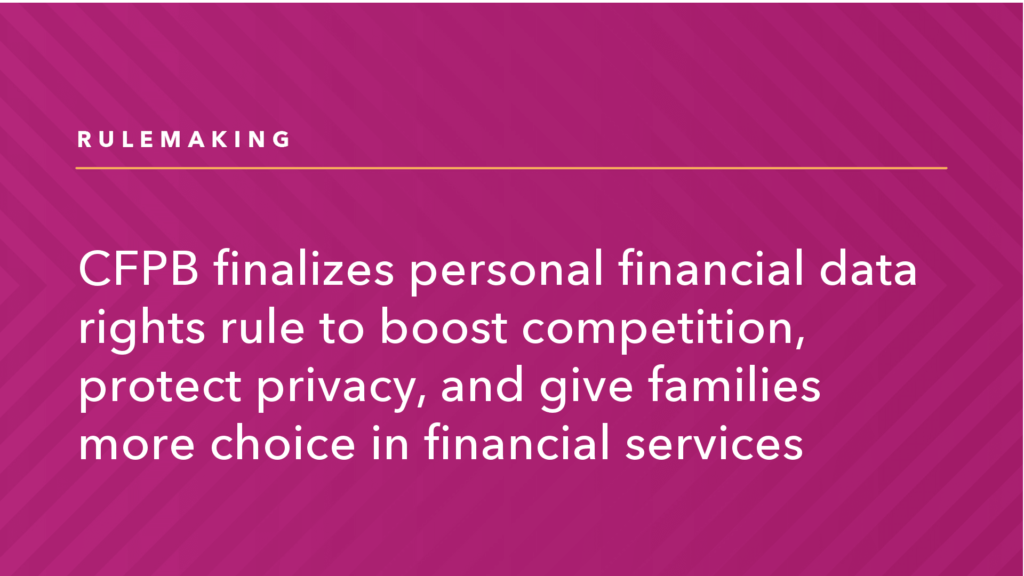WASHINGTON, DC – Today, the Consumer Financial Protection Bureau (CFPB) finalized rules that give consumers greater rights, privacy, and security over their personal financial data. The rule requires financial institutions, credit card issuers, and other financial providers to unlock an individual’s personal financial data and transfer it to another provider free of charge upon a consumer’s request. I am. Consumers will be able to more easily switch to a provider that offers better rates and service. By promoting competition and consumer choice, the rules will help lower loan prices and improve customer service across payments, credit and banking markets.
“Too many Americans are trapped in financial products with poor interest rates and poor service,” said CFPB Director Rohit Chopra. “Today’s action will help people get better rates and service on their bank accounts, credit cards and more.”
Today’s rules allow consumers to access and share data associated with bank accounts, credit cards, mobile wallets, payment apps, and other financial products. It aims to address market concentration that limits consumer choice over financial products and services. Consumers can access, or allow third parties to access, data such as transaction information, account balance information, information needed to initiate payments, future billing information, and basic account verification information. It will be. Financial providers must make this information available without charge.
This rule brings the United States closer to a competitive, safe, secure, and trusted “open banking” system. Today’s rule is part of the CFPB’s efforts to finally activate Section 1033 of the Consumer Financial Protection Act, a dormant statutory authority enacted by Congress in 2010. This is the CFPB’s first significant rule to accelerate responsible open banking in the United States, and the CFPB continues to develop additional rules to address more products, services, and use cases. The rules will encourage competition by giving people more freedom to change banks and providers and shop around for the best deals. This increase in choice will lead financial institutions to offer improved products that help attract new customers and retain old ones.
Today’s regulations also establish strong privacy protections and mandate that personal financial data can only be used for the purposes requested by the consumer. This prevents third parties from using consumer data for other purposes that benefit the third party but are not desired by the consumer. This will also help the industry move away from “screen scraping”. This remains a common but dangerous practice, where consumers typically provide their account passwords to third parties to access data indiscriminately through online banking portals.
To give consumers more control over their financial data, the Personal Financial Data Rights Final Rule will create greater choice and increase competition by allowing people to: .
Eliminate fintechs and banks that offer poor service: Consumers can now transfer their banking data to another bank, keeping much of their banking history intact even if they switch to another financial institution. You will be able to hold it. People no longer have to pay fees or jump through hurdles from companies that make it difficult to switch providers. Shop for better rates on products and credit: Consumers can compare purchases and move to competitors that offer better rates, including higher interest rates. Lower interest rates on deposits and loans. It also helps people access credit, including young people and other consumers with short credit histories, by allowing lenders to use data held by other institutions, such as information about income and expenses, to make loans. , it can also help you get credit on better terms. Secure payments, including “bank payments”: This rule allows consumers to share payment information securely and helps facilitate payments, sometimes referred to as bank payments. Such products allow consumers to make payments to merchants, peers, etc., and to move money between their accounts. The rules will help bring more competition to a payments market that has long been plagued by anti-competitive practices.
The final rule increases protections for consumer data by:
No bait-and-switch data collection: Third parties may collect, use, or retain data only to provide the product the consumer requested. For example, we secretly collect and use consumer data for business reasons unrelated to us, such as providing loans to consumers using consumer data that we also use for targeted advertising. , or cannot be retained. The rule does not prohibit certain uses of data, but requires that all uses be driven by what is necessary to provide the products consumers want. Creating revocation and deletion rights: Rules require access to data if the user revoke access. It will exit immediately and deletion will be the default method. Access cannot be maintained for more than one year without explicit re-authentication. To prevent “dark patterns” from emerging, the process for revoking access must be simple and easy.
Compliance with this rule will be phased in, with larger providers being subject to the rule sooner than smaller providers. Financial companies are required to comply depending on their size. The largest financial institutions must be compliant by April 1, 2026, and the smallest covered financial institutions must be compliant by April 1, 2030. Some small banks and credit unions are exempt from this rule.
In June, the CFPB finalized rules outlining the qualifications to become a recognized industry standards-setting organization that can issue standards that companies can use to comply with the CFPB’s Personal Financial Data Rights Rule.
Read the regulatory text of the final Personal Financial Data Rights Rule .
Read the Final Personal Financial Data Rights Regulation Notice.
Consumers can file complaints about financial products or services by visiting the CFPB’s website or by calling (855) 411-CFPB (2372).
Employees who believe their company is violating the Federal Consumer Financial Protection Act are encouraged to send information they know to whistlebwer@cfpb.gov.
The Consumer Financial Protection Bureau is a 21st century agency that enforces and enforces federal consumer financial laws and ensures that the markets for consumer financial products are fair, transparent, and competitive. For more information, please visit www.consumerfinance.gov.



